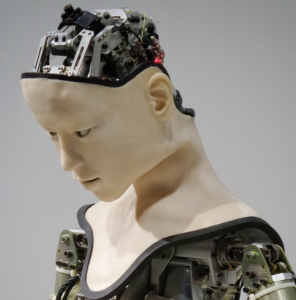
By Pratibha Jain, member of the Artificial Intelligence Society at King’s College London
Artificial intelligence (AI) has become the new normal in the digital world. From games to movies to health, applications of AI can be seen everywhere.
Some companies have gone extra steps to file patents (exclusive rights granted for an invention) for revolutionary, cutting edge-technologies. These technologies, if brought to life, may change the role technology plays in our lives and raise a lot of questions about the human aspect of Artificial Intelligence. Here are some interesting patents.
-
Microsoft’s patent to record and score meetings based on body language and facial expressions
This patent filed by Microsoft could allow employers to score events and meetings based on the engagement from their employees through their facial expressions and body language. Sensors in the “meeting-insight computing system” could track which attendees actually attend meetings attentively, and look for some patterns of boredom and fatigue. In fact, employees’ mobile devices could also be tracked to monitor if they were multitasking (texting or browsing the internet). Microsoft says this system would help improve the quality of meetings and hence, boost employee productivity. But, such surveillance is an invasion of privacy. In fact, H&M was fined £32.1mn for illegal surveillance of its employees.
-
Spotify’s patent to record user speech
In January 2021, Spotify’s patent to “identify taste attributes from users’ voice” was approved. This technology would use the microphone of the user’s device to record and analyse audio, which it will use to understand music preferences and make recommendations. The technology has taken personalisation to the next level, claiming to detect the user’s age, accent, race, gender and mood by assessing speech and background noise. Spotify says that this would save users from the tedious task of selecting their preferences on the app. But this would be at the cost of privacy violation and discrimination. After all, no system can predict someone’s race or gender with 100% accuracy merely by their voice. And, how safe is it to let a system constantly record your surroundings’ audio?
-
Microsoft’s patent to revive the dead as chatbots
Recording and analysing user behaviour is one thing, and talking to the dead is a whole other level of innovation. Microsoft was granted a patent for a technology to create chatbots of fictional characters, and dead loved ones in December 2020. It will use “social data” like images, voice, social media posts and electronic messages of a person to create a personal chatbot, with personality traits like tone, style, interests and opinions. It could also use voice and facial recognition to create 2D or 3D models of a person. So, you can essentially touch and talk to this virtual model just like any other person. In fact, with this technology, people could create their digital versions before they die. But, to create such a chatbot, all your social activity will be tracked and monitored, putting your privacy and data rights at risk. It is not just a privacy issue; This technology could blur the line between fiction and reality, and push humans to madness if they live in a make-believe world of their dead loved ones’ chatbots.
While these patents are mind-blowing and scary at the same time, most companies do not plan on turning them into actual technologies. After all, one cannot ignore the data privacy and ethical risks these technologies might lead to once they are in motion. Then, why file for patents anyway?
To stay ahead of the competition. Yes, it is indeed a cat and mouse run for big tech. With technology changing at a break-neck pace, and new innovations coming in so often, companies do not want to risk losing to competition. They want their innovative ideas to be protected from plagiarism, hence, they keep filing patents without the intent of implementation.
Research suggests that the US had 279,145 AI-related patent applications as of March 2019. As of 2020, IBM had the largest number of active ML and AI patent families globally, owning 5,538 families.
So much so for competition and power. Our privacy and data rights are protected until these patents turn into real technologies. But, what if the technologies come to life? A world where our employer tracks our devices all day sounds scary. Talking to fictional characters or our dead loved ones sounds straight out of a sci-fi movie. AI ethics communities will have to rise against big tech to protect consumers. After all, humans cannot be put at risk for machines in the real, physical world.